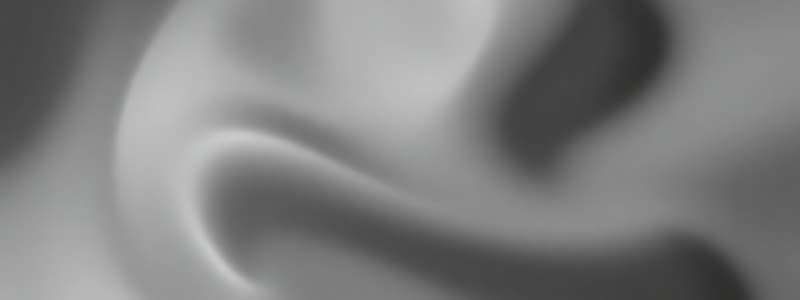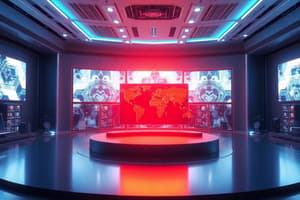Podcast
Questions and Answers
What is a common use of logical (Boolean) operators in 3D modeling?
What is a common use of logical (Boolean) operators in 3D modeling?
Which geometric primitive is NOT commonly used in 3D modeling?
Which geometric primitive is NOT commonly used in 3D modeling?
What is the result of using the difference operator in Boolean operations?
What is the result of using the difference operator in Boolean operations?
Control vertices in 3D modeling allow manipulation along which axes?
Control vertices in 3D modeling allow manipulation along which axes?
Signup and view all the answers
What differentiates primitive modeling from other modeling techniques?
What differentiates primitive modeling from other modeling techniques?
Signup and view all the answers
What is the main purpose of using successive shape refinements in subdivision modelling?
What is the main purpose of using successive shape refinements in subdivision modelling?
Signup and view all the answers
Which technique allows for creating a symmetrical object by modeling only part of it?
Which technique allows for creating a symmetrical object by modeling only part of it?
Signup and view all the answers
How does 3D scanning generate a polygonal mesh?
How does 3D scanning generate a polygonal mesh?
Signup and view all the answers
What type of information does photogrammetry extract to reconstruct 3D environments?
What type of information does photogrammetry extract to reconstruct 3D environments?
Signup and view all the answers
What defines the path in the extrusion technique?
What defines the path in the extrusion technique?
Signup and view all the answers
Which modelling technique allows for more complex shapes by using a curved path?
Which modelling technique allows for more complex shapes by using a curved path?
Signup and view all the answers
What is a notable advantage of procedural modelling?
What is a notable advantage of procedural modelling?
Signup and view all the answers
In the lathe/revolve technique, what must be defined?
In the lathe/revolve technique, what must be defined?
Signup and view all the answers
What kind of objects can procedural modelling be used to create?
What kind of objects can procedural modelling be used to create?
Signup and view all the answers
What is a key component in edge/contour modelling?
What is a key component in edge/contour modelling?
Signup and view all the answers
What is the first stage in the simulation of a 3D scene?
What is the first stage in the simulation of a 3D scene?
Signup and view all the answers
Which of the following techniques approximates curved surfaces using polygons?
Which of the following techniques approximates curved surfaces using polygons?
Signup and view all the answers
What is a defining characteristic of Bézier curves?
What is a defining characteristic of Bézier curves?
Signup and view all the answers
What additional information differentiates a B-spline curve from a Bézier curve?
What additional information differentiates a B-spline curve from a Bézier curve?
Signup and view all the answers
NURBS are commonly used for which of the following applications?
NURBS are commonly used for which of the following applications?
Signup and view all the answers
Which of the following describes the order of a NURBS curve?
Which of the following describes the order of a NURBS curve?
Signup and view all the answers
Digital sculpting is primarily characterized by which of the following?
Digital sculpting is primarily characterized by which of the following?
Signup and view all the answers
What term is often used interchangeably with curved lines in modelling?
What term is often used interchangeably with curved lines in modelling?
Signup and view all the answers
What are control points in curve modelling used for?
What are control points in curve modelling used for?
Signup and view all the answers
Which of the following statements about polygonal modelling is true?
Which of the following statements about polygonal modelling is true?
Signup and view all the answers
Which of the following best describes fractals?
Which of the following best describes fractals?
Signup and view all the answers
What are the components that need to be defined in a particle system?
What are the components that need to be defined in a particle system?
Signup and view all the answers
L-Systems are based on which of the following concepts?
L-Systems are based on which of the following concepts?
Signup and view all the answers
What is the primary function of geometry nodes in a procedural modeling workflow?
What is the primary function of geometry nodes in a procedural modeling workflow?
Signup and view all the answers
In creating imaginary landscapes, what is typically the first step?
In creating imaginary landscapes, what is typically the first step?
Signup and view all the answers
Which of the following is NOT typically a part of digital sculpting?
Which of the following is NOT typically a part of digital sculpting?
Signup and view all the answers
Beveling in 3D modeling serves what purpose?
Beveling in 3D modeling serves what purpose?
Signup and view all the answers
Which statement best describes how particles in a particle system behave?
Which statement best describes how particles in a particle system behave?
Signup and view all the answers
What is an example of a procedural modeling tool mentioned in the content?
What is an example of a procedural modeling tool mentioned in the content?
Signup and view all the answers
Fractals are described as being all of the following EXCEPT:
Fractals are described as being all of the following EXCEPT:
Signup and view all the answers
What defines the outputs in a geometry nodes setup?
What defines the outputs in a geometry nodes setup?
Signup and view all the answers
Which aspect is NOT involved in the simulation of natural phenomena using particle systems?
Which aspect is NOT involved in the simulation of natural phenomena using particle systems?
Signup and view all the answers
What is one primary benefit of using procedural modeling techniques?
What is one primary benefit of using procedural modeling techniques?
Signup and view all the answers
Study Notes
Modelling Techniques in Games and Multimedia
- Normal modelling starts with sketches and blueprints
- Conceptualization and design of the 3D model is the first step in simulating a 3D scene. This is crucial for artists choosing the best modelling technique for desired results.
- Shape, position, size, colour, texture, lights, and camera are all set at this stage.
Curve Modelling
- Defines surfaces using curves such as splines, Bézier, nonuniform rational B-spline (NURBS)
- Bézier curves have controllable points and can be Linear, Quadratic, Cubic, or Higher Order.
- B-spline curves are similar to Bézier but with additional information between control points.
- NURBS (Non-Uniform Rational Basis Spline) is a mathematical tool used to generate and represent curves and surfaces. It's widely used in automotive and industrial modelling (CAD).
- NURBS are defined by order, weighted control points, and a knot vector.
- NURBS can create 3D surfaces by using two or more curves in a 3D space
Polygonal Modelling
- Built with polygons like cubes, sphere, cylinder, cone, torus, and regular polyhedral
- Primitive modelling uses standard geometric shapes to create models
- Geometric transformations applied to the primitives change their size, position, and orientation
Logical (Boolean) Operators
- Used to combine and subtract shapes
- Operations are Union, Intersection, and Difference
- Difference is useful for creating holes
Box/Subdivision Modelling
- Starts with a low-resolution primitive and refines it through interpolation, averaging, approximation, and insertion of new points.
- Results in a high poly object
Mirroring Technique
- Models a section of a symmetrical object and mirrors it along an axis or specific point.
Edge/Contour Modelling
- Builds an object piece by piece by placing polygonal faces along prominent contours.
- Fills any gaps that occur
3D Scanning
- Digitizes real-world objects.
- Captures geometric data for a polygonal mesh
- Can be used to capture the geometry of objects and textures
Photogrammetry
- Reconstructs 3D environments by extracting information from photographs.
- Software reconstructs the geometry of the space.
- Requires point identification of the shapes in the photos.
Sweeping
- Uses a 2D outline along a predefined path to create a 3D shape
- Types of sweeping include extrusion, free-form sweeping, and lathe/revolve
- Extrusion adds geometry to a polygon primitive, creating faces of the same size and shape.
- Free-form sweeping uses a curved path for extrusion.
- Lathe/revolve rotates a 2D outline around an axis, creating a 3D shape with geometric symmetry.
Procedural Modelling
- Generates 3D geometry using an algorithmic process.
- Increases productivity and is widely used in films, animation, and video games.
- Applications include creating buildings, vegetation, terrains, textures, clouds, water, fire, explosions
Procedural Modelling – Fractals
- Creates models that are difficult to make through geometric modelling
- Found in nature, are mathematical, recursive, and have repeated patterns
- Trees and landscapes can be generated using procedural modelling - fractals.
Procedural Modelling – Particle System
- Simulates natural phenomena like fire, explosions, smoke, rain, snow, hair, fur, grass
- Uses simple shapes with specific time-based behaviours
- Features: particle number, lifetime, randomness, emitter, normal
Procedural Modelling – L-Systems
- A formal grammar that uses an alphabet of symbols, production rules, and parallel rewriting system.
- L-systems are used to generate complex patterns and shapes.
Procedural Modelling - Textures
- Procedural modelling can also be used for texture generation.
Geometry Nodes
- Blocks containing data that transform inputs into outputs based on user-defined parameters.
- Used to alter the geometry of objects and create other modifications in Blender and Houdini.
- Efficient, minimizes errors and increases scalability
Landscapes
- Procedural modelling can be used to create both real and imaginary landscapes.
- Real landscapes are generated from contour data or height/displacement maps.
- Imaginary landscapes are created through point manipulation or mathematical functions.
Beveling
- Smooths sharp edges between adjacent facets.
- Controlled by distance, radius, or angle.
Digital Sculpting
- Digitally manipulates 3D models as if they were clay.
- Common actions include push, pull, smooth, grab, and pinch.
Studying That Suits You
Use AI to generate personalized quizzes and flashcards to suit your learning preferences.
Description
Explore the foundational concepts of 3D modelling techniques crucial for game development and multimedia design. This quiz covers the various methods, including curve modelling with Bézier and NURBS, which are essential for creating lifelike models and textures. Test your knowledge on the principles that guide the creation of compelling 3D scenes.



